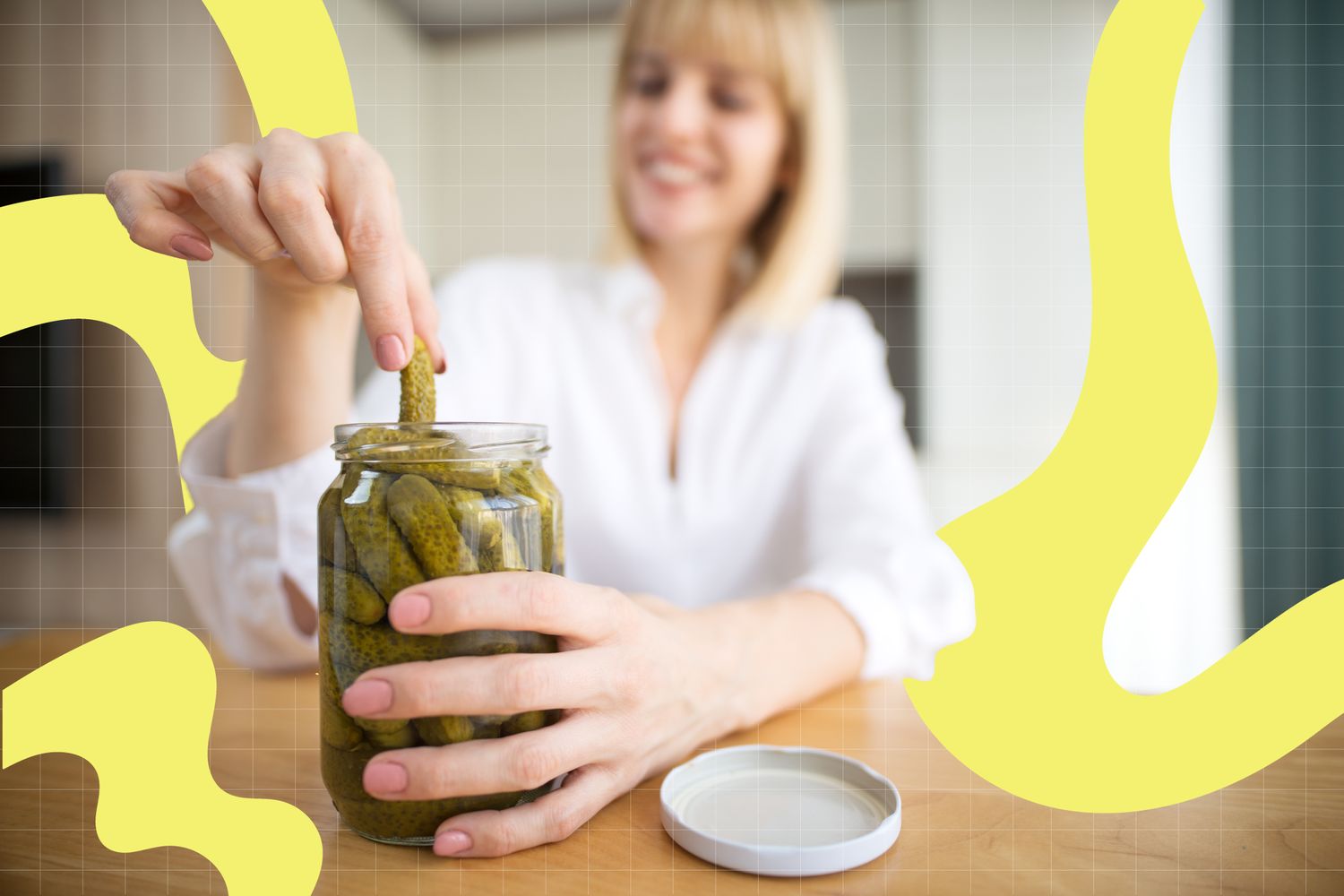Fermented pickles contain probiotics that can help support a healthy and diverse gut microbiome.Non-fermented pickles, made with vinegar, lack probiotics and may not offer gut-health benefits. Choose lower-sodium pickles to support gut, heart and overall health.
Pickles can be polarizing—most people either love them or leave them on the side of the plate. And ideally, those two people dine together, because getting an extra pickle with your sandwich is a win (speaking from experience). But beyond their salty and tangy flavor, do pickles actually offer gut-health benefits? The answer depends on how they are made. Here’s how to identify whether or not your pickles fit that bill.
What Makes a Food Gut-Healthy?
When it comes to gut health, two nutrients often come up: prebiotics and probiotics. Prebiotics are a type of fiber that feeds the beneficial bacteria in your gut, while probiotics are living microbes that help support a healthy and diverse microbiome. Therefore, a food that contains either or both of these can make it beneficial for your gut. Plus, gut-healthy foods not only support your gut health, but also benefit your body as a whole, from your brain to your heart and even your immune system.
So, do pickles fall into these categories? It depends on the type.
Fermented vs. Non-Fermented Pickles
Fermented Pickles
It might surprise you to hear that the original pickles were fermented. In fact, fermented pickles have become so popular that they remain a staple in many cuisines worldwide. Fermented pickles are made by submerging them in a saltwater brine (plus any additional desired seasonings) and leaving them at room temperature. Many recipes are measured by the weight of each ingredient used, and recommend adding 2 to 5% salt by weight compared to the weight of water that’s used. This salt percentage creates a safe environment for beneficial microbes to flourish, while keeping harmful ones at bay. Over time, generally after one to two weeks, these good bacteria produce lactic acid, which gives fermented pickles their signature tangy flavor.
These beneficial bacteria not only add great flavor to fermented pickles but also provide gut-healthy probiotics. And cucumbers aren’t the only veggie that can be fermented: cabbage (hello, sauerkraut) and radishes (a staple in some Korean kimchi) also benefit from this process. You can make fermented pickles at home using proper sanitation practices and techniques, or look for them at some grocery stores (check the refrigerated aisles if you’re having a hard time finding them).
While these types of pickles are rich in probiotics, they can be relatively low in fiber depending on the vegetable you use. Cucumbers, for example, only contain 1 gram of fiber per ½ cup serving.
Non-Fermented Pickles
Most pickles you’ll find on the shelves are not fermented. These are typically made by adding the cucumbers to a tangy, vinegar-based brine. Adding vinegar to the vegetables helps to preserve them and create the desired pickled flavor, but it inhibits the growth of bacteria needed for fermentation. Non-fermented pickles are also typically stored in the refrigerator below 40℉, which is a temperature where fermentation can’t occur. This means that non-fermented pickles won’t contain gut-healthy probiotics.
What about prebiotics? The amount of prebiotic fiber in cucumber pickles is relatively low, as the lack of fermentation does not alter their fiber content. However, other pickled vegetables, like carrots and green beans, may offer slightly more. That said, pickled vegetables aren’t the only source of prebiotics. Foods like potatoes, oats, garlic and artichokes offer more prebiotics and better support to your gut health.
While non-fermented pickles can be a delicious addition to your diet, they are less likely to offer gut-health benefits when compared to fermented pickles.
Tips for Choosing Gut-Healthy Pickles
If you enjoy pickles, they can absolutely be part of your healthy eating pattern. Here’s what to look for when shopping for pickles:
Look at the Ingredients List: Fermented pickles should contain just the vegetable, salt, water and any seasonings used. If the ingredients list includes vinegar, it’s not fermented. Watch Out for the Sodium: Regardless of whether they are fermented or not, most pickles are high in sodium. That’s due to the salt that’s added for preservation and flavoring. Most Americans consume too much sodium in their daily diets, and excessive sodium intake can lead to long-term health consequences, including high blood pressure and adverse effects on gut health. When choosing pickles, compare labels to find a lower-sodium option.
Our Expert Take
While some pickles can offer impressive gut-health benefits, not all pickles are made in the same way. If gut health is your goal, opt for fermented pickles rather than non-fermented pickles since they contain probiotics (good-for-you bacteria).
Both types of pickles are usually high in sodium, so it’s wise to look at the labels and opt for those with lower sodium content. Research has shown that high sodium intake can increase the risk of high blood pressure and can lead to adverse effects on the gut. And for some, high-acid, high-sodium foods like pickles could lead to unpleasant digestive symptoms like reflux or bloating.
That said, any type of pickle can fit into a healthy eating pattern if you enjoy them. And let’s be honest, they’re downright delicious, which is a good enough reason to enjoy them on occasion.

